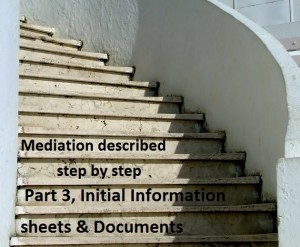 Family mediation is here to stay. But how does it work? What actually happens? How can you make sure the settlements reached are fair, and what do couples who mediate have to do? The purpose of this 12-part series is to attempt to answer those questions specifically – at least as it applies for those who choose New Landscape Mediation to help them create their solutions. Whether we are working with clients from our main offices near Stansted airport in Essex, our offices in central London, or in Cambridge, this series of blogs will better help you to understand how we go about saving our clients up to £20,000 each over a more traditional, solicitor led settlement solution.
Family mediation is here to stay. But how does it work? What actually happens? How can you make sure the settlements reached are fair, and what do couples who mediate have to do? The purpose of this 12-part series is to attempt to answer those questions specifically – at least as it applies for those who choose New Landscape Mediation to help them create their solutions. Whether we are working with clients from our main offices near Stansted airport in Essex, our offices in central London, or in Cambridge, this series of blogs will better help you to understand how we go about saving our clients up to £20,000 each over a more traditional, solicitor led settlement solution.
Here in part 3 of this series I will describe what you can expect from us in terms of information and other documentation prior to any meetings or personal discussion taking place.
If you look at any list of life’s most stressful situations you will find divorce in the top three every time. We know that not only is it stressful, but often deeply traumatic, and always very personal. At New Landscape Mediation we work on the assumption that people don’t want to be kept in the dark about what is happening, and in fact we like to take things a step further. As Family Mediation Council Accredited (FMCA) mediators we want you to be as aware of, and as involved in your own future as you possibly can be. We take this idea seriously and it is why, right from your first conversation with either Carolyn Hanes or Johnathan Pease you will be provided with as much information as you could possibly need in regards to what is happening, and what needs to happen next.
Following that first conversation, whether it results in arranging an initial private meeting or not, we will provide you with a range of information sheets to empower you in your choices going forward. Our information sheets cover a very wide range of topics, and it is a catalogue of writing that grows on a monthly basis. All of our info sheets can be found and downloaded from the resources section on our website and we invite you to browse them freely.
The next blog in this series will discuss what happens in the initial, pre-mediation MIAM if you attend one. If you would like more information about any aspect of this series, please contact our offices on 01279 211 657 or send us an email for a fully confidential discussion of your needs.

